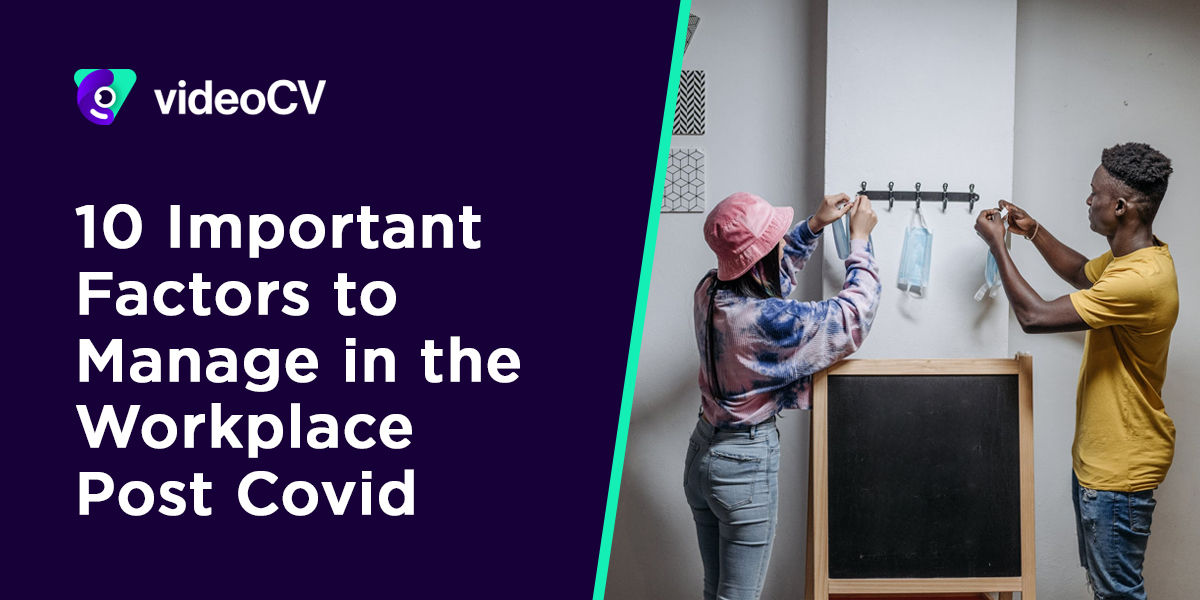10 Important Factors to Manage in the Workplace Post Covid
The workplace is changing, and so must we. Even though this change can be alarming, it gives us a chance to find new solutions.
The global recession led to a massive restructuring of established businesses and the emergence of new companies and products in the industry. To reduce the spread of the virus, people who work in offices have started to adopt new habits, and the hiring process has seen a massive restructuring as well.
Now that talks of recovery for businesses around the world grow louder, the discussion also includes how the pandemic has fundamentally changed the way we do things in the workplace. Despite the difficult landscape, companies must be ready to adapt to the new reality pioneered by COVID. As we begin to understand the impact of business mobility on the workforce, there seems to be an evolving sentiment that perhaps the pandemic has brought something positive to the table.
Companies in the current economic and business environment have had to adapt to survive. As a result, they’ve had to make some important changes in how they recruit and manage their employees. The need for technology in recruitment has grown rapidly, and it continues to be key in the current market.
In these tough economic times, companies have been trying to have a more effective recruitment process. In order to do that, they have been deploying new strategies as well as focusing on the ones that were already essential.
Today’s top recruiters are less focused on the dangers of technology and more interested in leveraging AI to make candidate interaction smarter, quicker, and more impactful. Let’s take a look at how the covid-19 pandemic has restructured many aspects of the workplace, including the recruitment process.
1. Virtual Hiring has a Permanent Position
If you thought virtual hiring was just a trend that would fall away post COVID, you couldn't be more mistaken.
According to 70% of survey respondents on Linkedin, virtual hiring now has a permanent seat at the recruitment table. This survey indicates that a hybrid workforce of onsite and remote employees will become more normalized and so will an interview process that combines virtual and in-person processes.
In the last decade, companies have been increasingly hiring candidates online. While virtual interviews can be challenging for both parties, the time and cost savings make them well worth it. This process has skyrocketed in recent times since the pandemic, and companies have been happily forced to embrace the virtual interview process because its benefits greatly outweigh the costs involved.
Virtual interviews and virtual screenings are here to stay. The advent of video conferencing technology and innovations in recruitment processes have made virtual interviews a viable option not only for startups who can't afford an office, but also for companies who want to keep costs down and assess potential candidates efficiently.
2. Return to work performance tracking
And as companies begin to open up their office doors again, whether virtual or traditional brick and mortar, a return to work performance tracking feature will be commonplace in most workplaces. There are multiple hr metrics to track, including people metrics, workforce stability kpi, and office metrics, that all form part of a strong workforce metrics analysis. These metrics will assist companies in deciphering exactly how to run a successful business both during and after the covid-19 pandemic. The HR metrics that matter the most are these listed above, and they will help with any company wanting to embark on a “return to work performance tracking” program.
Work from home performance metrics should also be considered- especially in workplaces that choose to embrace remote work and employees working from home.
How do metrics work? Strong workforce metrics can do more than simply implement a return to work performance tracking plan.
Employees returning to the workplace will need just as much motivation as stay at home employees, and a return to work performance tracking program can help to achieve that goal. While it doesn't have to be a kindergarten function of reward and recognition, allowing employees to have access to these metrics can help to shape how they do their work. If employees are witnessing how their work is making a positive impact on the company they are more likely to have a drive to perform better.
These metrics can be used to analyse employees that return to work, staff that continue with remote work, or simply additional employees that are onboarded to help get a company back on track post pandemic.
3. Importance on RTW (Return to Work) Strategies
It goes without saying that if a business wants to thrive post pandemic, then a robust RTW strategy needs to be in place. Now that the entire globe has experienced this collective disruption, it is highly likely that RTW strategies will continue to receive focus even years down the road. Because they act as preventative measures too- if they are in place early enough. For a company just beginning to rehire candidates and employees, they need to be aware of several factors that include how to continue business operations while still allowing employees to socially distance to ensure the risk of exposure remains as low as possible.
4. No more location limits
Many companies need to transfer parts or all of their operations online to comply with COVID-19, proving that location doesn't need to constrict certain aspects of a business— including recruitment.
Consequently, there is a growing need for a comprehensive digital recruitment process that allows companies to reach, attract and hire talented individuals from anywhere in the world.
Online talent recruitment has changed the way that people look for work.
Although there has been a surge of remote/online work options, companies still lack the ability to attract talent from around the world via a platform that is both efficient and cost-effective.
There is a large group of highly-qualified applicants that companies can now recruit from without having to relocate them. Now you're able to not only look for people with the exact set of skills you're looking for, but also hire people you wouldn't have the opportunity to hire before. Now you're able to not only look for people with the exact set of skills you're looking for, but also hire people you wouldn't have the opportunity to hire before.
5. Demand is changing
As much as we like to romanticize the idea of entrepreneurial spirit and taking great risks, the truth is that we all often seek job security, especially during uncertain times.
It’s a natural human tendency to seek job security during unstable economic times. As industries evolve, employees may begin to seek out older, more stable companies. In times when job security is a great concern, young professionals have been known to leave the fast-paced and risky world of start-up companies in search for a more stable, yet less challenging job.
Additionally, as technology and other newer industries continue to grow and innovate and take over much of the economy, more people will be pushed there as they see it as an attractive place for them to be. Technology professions are currently among the most sought after professions, as more professionals are anticipating the expansion of the tech industry.
6. Companies must be prepared to sell themselves to prospective employees
In the wake of COVID, it will become paramount for companies to be able to present their story accurately. While it has been important for companies to sell themselves to potential candidates, it has become more important post-COVID.
Over the next few years, businesses will continue to recover, and this means that professionals will have more opportunities to change jobs. So businesses will naturally have to be more attractive and sell themselves to attract candidates that will offer the highest value for their company.
The new interview process usually involves both parties -- the company and the candidate -- trying to learn more about each other. The mutual desire results in increased odds of a mutually beneficial relationship forming.
7. Company culture is in the spotlight
More and more people are looking for a flexible or remote job, keep in mind that the physical workplace will not be as important. While the pandemic instigated a surge in remote working, people have begun to understand the benefits of remote working remoting and this is likely to be a trend that will continue post COVID. Flexible/remote jobs are appealing to many people. It provides personal time and creates opportunities for more engagement. However, the culture of the company is perhaps even more important than before. Regardless of whether a worker is on site or working remotely, companies will need to invest more in culture and values than before. It's important for companies to think about their company culture and what values they want to represent and under which they operate in order to recruit and retain talent.
8. Professionals are focusing on the value they can offer
In a world post COVID, we are seeing that there is a change in the way that professionals view what and how they can offer value to a company. This not only creates a positive impact for the companies they are working for, but offers a sense of personal fulfillment too.
Whether it is because of extended periods spent at home, where the thoughts can wander to these domains, or its just the aftermath of a pandemic is debatable. One thing is for sure; there is a clear trend for professionals to begin redefining their values, and how they want to contribute to society.
And how does this impact hiring post pandemic? Companies need to begin focusing on this too, and in the hiring process they can ask the right questions, to uncover the right people. But who is the right person? A good hire post pandemic is one that understands how he or she can add value to the company, their personal career, and society as a whole.
Companies need to accurately communicate their overall company goals during the interview process so they can discover the best hires, where values are aligned, for the job.
Furthermore, as a result of these long hours at home, professionals are finding new ways to work and reevaluating their definition of success. People are looking at what they do during their workday and reevaluating their passions. This encourages them to be better hires for your company, and recruiters should leverage this during the recruitment process for the betterment of their long term company goals. By asking the right questions during the interview stage, employees can gain a better understanding of what drives a candidate, and how each can offer value to the other.
9. Reputation is more important than ever
If a company is seeking experienced candidates that can offer high value to the company, they need to manage their reputation. As we move further down the digital rabbithole, we see that not much can remain hidden- the internet encourages transparency.
Sure, it can encourage misinformation, but when it comes to the professional hiring arena, candidates have more access than ever to a company’s public records and overall reputation.
The COVID pandemic rendered an effect on every industry across the globe. We saw countless jobs lost and many professionals were affected. Candidates will likely be looking at how companies handled these tough times- and can gain a good sense of how they responded and dealt with the challenges. Candidates will find out more about how companies treated their workers and what they've done to prepare for future tough economic times. Furthermore, candidates will choose to work for companies that promote a healthy, safe, and ethical environment.
10. Candidates will be looking for companies with executive leadership
It's clear that candidates know what's going on in the market, and how companies performed during the pandemic will make a big difference.
When the chips are down, the employer becomes the safety net. How a company leads the team through a crisis can make or break retention and attractiveness to new talent.
Now more than ever, employees look to their employers to lead the team through uncertain times, create stability, and provide job security. This is likely to be one of the most attractive features that a potential candidate is likely to look out for in a company.
The Bottom Line
The overall workplace as well as recruitment has changed. Now is the time to find out how that impacts your business.
VideoCV is the easiest way to manage your recruiting workflow. Manage your candidate pipeline, schedule interviews, track resumes, and find the ideal candidate with shared values that will continue adding value to the company long after the recruitment process is over.
Find out how VideoCV can benefit your company today, so that you can begin landing candidates that can make a valuable contribution to your company’s future.





